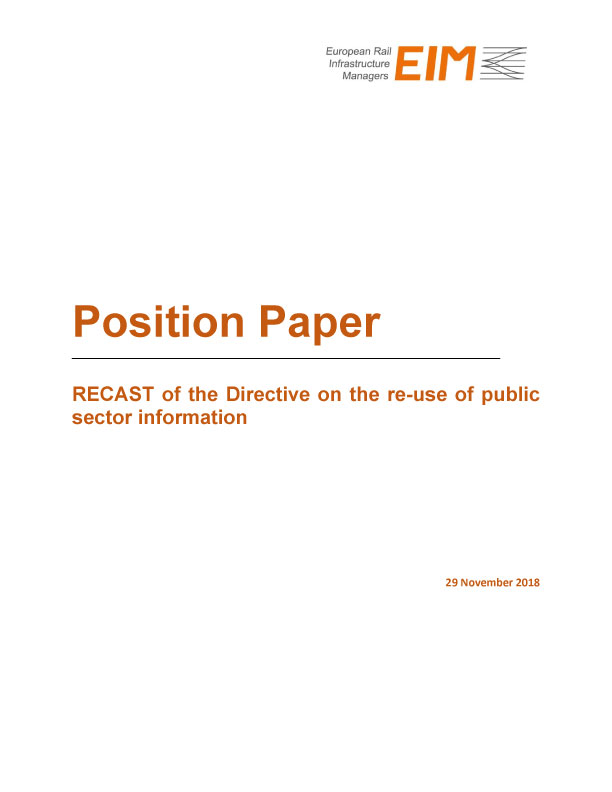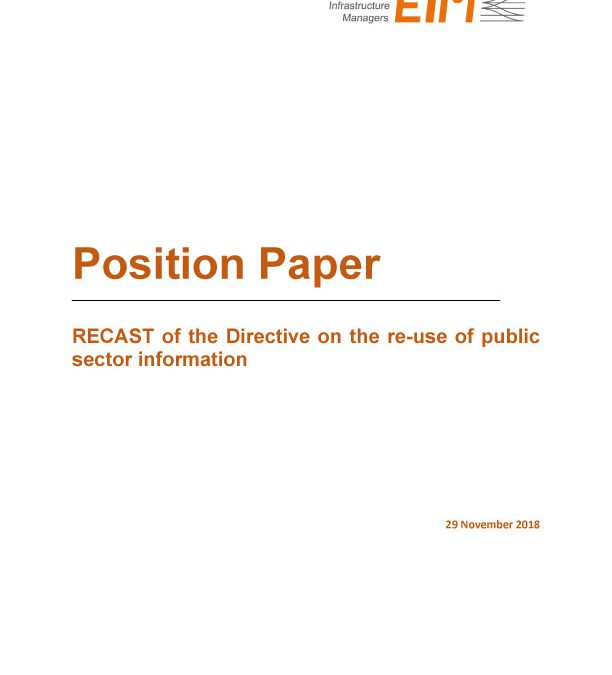Position Papers
On the 25th of April 2018, the European Commission adopted a proposal for a revision of the so-called ‘Public-Service-Information Directive (PSI-Directive)’ on the re-use of public sector information. The European Rail Infrastructure Managers (‘EIM’) are aware of the important role of data in nowadays society and are also willing to contribute towards the goal of creating a ‘digital economy’. Many members of EIM already operate online ‘data-platforms’ which are mostly free of charge and easily accessible, offering a wealth of data and information to rail end users. However, EIM shares some concerns regarding the scope of the Directive and the lack of added value of the Directive (especially vis-à-vis the already existing Directive on Intelligent Transport Systems). EIM also argues that the notion of ‘public works’ should be omitted from the scope of the ‘high value data sets’ because the obligations are not sufficiently clearly defined.
Background and legislative history
In 2003 the Directive on the re-use of public sector information was
adopted (Directive 2003/98/EC). The aim of the Directive was to
harmonise the basic conditions for the re-use of public sector
information and to remove major barriers to the re-use of this
information within the internal market. The 2003-Directive was
subsequently amended in 2013, resulting in Directive 2013/37/EU.
Now that data has become more and more important in society, this topic
has gained in importance. At the 2017 mid-term review of the European
Commission’s (‘EC’) digital single market strategy, it was decided that
the data economy should be identified as one of the top three priority
areas for action.
Therefore, on the 25th of April 2018, the European Commission adopted a
proposal for a revision on the PSI-Directive on the re-use of public
sector information, the ‘recast-Directive’. The file was assigned to the
Committee on Industry, Research and Energy (ITRE) within the European
Parliament. This Committee published its report on 12 September 2018,
following MEPs’ amendments. The Council of the European Union published
its position on 25 October 2018. The ITRE-Committee vote is scheduled
for the 3rd of December 2018.
The European Rail Infrastructure Managers (‘EIM’) are aware of the
important role of data in nowadays society and are also willing to
contribute towards the goal of creating a ‘digital economy’. Many
members of EIM already operate online ‘data-platforms’ which are mostly
free of charge and easily accessible, offering a wealth of data and
information to rail end users.
However, EIM would like to make the following remarks concerning the proposed Directive:
Scope
Concerning the scope of the Directive, EIM strongly urges to follow the
position of ITRE Rapporteur MEP Neoklis Sylikiotis and exclude public
undertakings from the scope of the Directive. Public undertakings can in
many fields compete with private undertakings, even when providing
services of general interest. Including public undertakings in the scope
would create the risk that private undertakings can take advantage of
data from public undertakings at little or no costs.
ITS Directive
Moreover, EIM does not see the added value of including the transport
sector within the scope of the proposed Directive. The transport sector
(including infrastructure managers, ‘IMs’) is already covered by the
Intelligent Transport Systems Directive (‘ITS-Directive’) and its
Delegated act EU 2017/1926. This act needs to be implemented into
national law by 2019. Through this act, the transport sector has the
obligation to make available travel-related data via so-called ‘national
access points’.
By using two legislative instruments to regulate the same topic, the
proposal risks creating a situation of legal uncertainty and
incompatibility between the two Directives. Moreover, as mentioned
before, many Rail Infrastructure Managers are already in the process of
releasing data into open platforms.
Additional legislation is not necessary and does not contribute to the
goal of creating less regulatory burden within the EU. Therefore,
transport should be left out of the scope of the recast Directive
because the ITS Directive already puts obligations on Infrastructure
Managers in terms of public data dissemination. Priority should be given
to sectoral legislation.
High value data sets
Article 13 sets out the obligation of the adoption of a list of
so-called ‘high value data sets’. The data-sets that are qualified as
such are subject to specific conditions: the re-use of high value
datasets shall be free of charge and must be made available through the
use of so-called API’s (‘application programming interface’).
What data should be exactly considered as a ‘high-value dataset’ is
currently subject to debate. EIM would like to see, regarding the
obligations for the transport sector, a delegated act that confers
obligations on IMs that do not go beyond the obligations as currently
imposed by the ITS-Directive.
Amendments
Amendments 321 and 322 to the EP Draft Report propose for the inclusion
of real-time information on public works on infrastructure.
As stated before, EIM strongly advocates transparency and open data in
the area of Transport. Many EIM-members already publish information
related to major rail infrastructure works including changes to planned
rail passenger services as a result of public works.
However, EIM questions the socio-economic benefit of including datasets
on public rail infrastructure works within the scope of High Value
Datasets. The identification of any specific types of high value
datasets and the provision of those datasets via APIs must be based on
the assessment of their potential to generate important socio-economic
benefits and consider within that assessment the cost and resource
implications on public sector bodies.
Planning of rail infrastructure public works is complicated in nature
and requires the input of multiple stakeholders including rail
operators, local and national government. Without a clear assessment of
the value-add of making rail public works information available via
APIs, the provision would place an unreasonably high burden on
infrastructure managers to collate, verify and make available such
extensive datasets in a timely manner since public works are frequently
subject to (last-minute) changes. Making available such precise and
accurate data on public works could also lead to security concerns.
EIM therefore remarks that the added value of including public works in
the scope of High Value Datasets remains unclear and should therefore
be omitted from the scope of High Value datasets.



